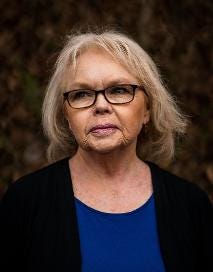"We're Tired of Everyone Else Trying to Write Our Story." A Chat with Marianne Worthington, Editor of Still: The Journal
Founder of Appalachian-themed online mag takes us behind the scenes
Good day! I come with tidings of a new editor interview, freshly wrapped.
Today I had the joy of chatting with Marianne Worthington, Editor of Still: The Journal. This “is an online literary magazine publishing Appalachian literary, visual, and musical artists since 2009.”
First things first: Marianne and I settled the question of the proper pronunciation of “Appalachia.” (Think of the short “a” in latch, not the long “a” in lake if you don’t want to sound like a clueless outsider.)
Also, many think of Appalachia as a handful of places or hiking trails. But, Marianne pointed out, the region is quite vast, diverse, and spans thirteen states.
Beyond that, we chatted about what inspired Marianne to start the magazine with two other writers, back in 2009. Of central importance to her and her co-founders (whom she met at a writing retreat) was having a place where people from Appalachia told their own stories about themselves, rather than letting that narrative be created by people outside the region.
Among the common stereotypes that people use in depicting the area, Marianne related, is the grandma sitting out on the back porch in a rocking chair. I noted that this was interesting because one of the nonfiction pieces in the current issue is about a grandmother (“No Trouble” by Wendy Miles).
This led to a discussion about what makes a work that draws on familiar subjects or tropes stand up on its own. How does a piece transcend stereotypes? In what ways can writers avoid sentimentality when writing about possibly sentimental subjects?
To these questions, Marianne had some great advice. (She is also a retired professor of writing.) Such suggestions include finding “the rough and rowdy,” finding “the ugly,” “the truth,” “the ugly truth,” and also focusing on sensory language.
Marianne is the Poetry Editor for the journal. In poetry, she is specifically looking for work that shows a “facility with language,” as well as elements of surprise, inventiveness and the unique and unexpected.
For all genres, submitted pieces need not necessarily be about Appalachia nor about a sense of place generally. What the editors are looking for is simply that the writer has a connection to the region. If you do, be sure to say so in your cover letter!
What other advice did Marianne offer for people who might wish their work to have a home in this magazine? What are some unexpected features of this region that more people should know? For these answers and so much more, you’ll have to watch the video!
Still: The Journal publishes three times per year. They are currently reading submissions for a climate-themed issue. They are interested in work that looks at Appalachia specifically and/or work created by writers with some connection to the area.
In addition to fiction, poetry and nonfiction, the journal also publishes reviews, interviews, visual art, multimedia art and writing prompts. If you are interested in reviewing books, interviewing someone or getting involved as a reader, you can email them directly: stilleditors@gmail.com.
No one came out to watch today’s chat. But that’s okay, friends. I love your faces anyway!
And, of course, huge thank you to Marianne for taking the time to take us behind the scenes of another special little lit mag.
Don’t miss the rest of this month’s interviews & info sessions! Learn more here.
If you’re part of the Lit Mag Reading Club, don’t forget to order your copy of Harvard Review asap!





I love this. Love Appalachian literature and enjoy seeing it grow in awareness. I am from an unusual place of “Urban Appalachia” in West PA and still say “AppalAchian” long “A” and was in a panel of linguists on “Creative Writing in Appalachia” at the MLA conference in Baltimore where we read our work. I was told by the linguist that long A or short, it’s ok and regional or personal preference. Just for whatever it’s worth. Not arguing it at all! Just wanted to share what she said.
Thanks for this. Litmags can be such a mystery to submit to. Nancy H Williard